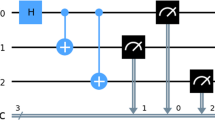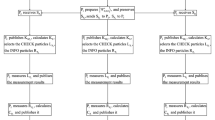Abstract
Blind quantum computation (BQC) enables ordinary clients to securely outsource their computation task to costly quantum servers. Besides two essential properties, namely correctness and blindness, practical BQC protocols also should make clients as classical as possible and tolerate faults from nonideal quantum channel. In this paper, using logical Bell states as quantum resource, we propose multi-server BQC protocols over collective-dephasing noise channel and collective-rotation noise channel, respectively. The proposed protocols permit completely or almost classical client, meet the correctness and blindness requirements of BQC protocol, and are typically practical BQC protocols.



Similar content being viewed by others
References
Nielsen, M.A., Chuang, I.L.: Quantum Computation and Quantum Information, 10 Anniversary edn. Cambridge University Press, Cambridge (2010)
Morimae, T., Fujii, K.: Blind quantum computation protocol in which Alice only makes measurements. Phys. Rev. A 87(5), 050301 (2013)
Broadbent, A., Fitzsimons, J., Kashefi, E.: Universal blind quantum computation. In: Proceedings of the 50th Annual IEEE Symposium on Foundations of Computer Science (FOCS 09). IEEE. pp. 517–526 (2009)
Childs, A.M.: Secure assisted quantum computation. Quantum Inf. Comput. 5(6), 456–466 (2005)
Raussendorf, R., Browne, D.E., Briegel, H.J.: Measurement-based quantum computation on cluster states. Phys. Rev. A 68(2), 022312 (2003)
Chien, C.H., Meter, R.V., Kuo, S.Y.: Fault-tolerant operations for universal blind quantum computation. ACM J. Emerg. Technol. Comput. Syst. JETC 12(1), 9 (2015)
Takeuchi, Y., Fujii, K., Ikuta, R., et al.: Blind quantum computation over a collective-noise channel. Phys. Rev. A 93(5), 052307 (2016)
Sheng, Y.B., Zhou, L.: Blind Quantum Computation with Noise Environment. arXiv:1609.08902 (2016)
Fitzsimons, J.F., Kashefi, E.: Unconditionally Verifiable Blind Computation. arXiv:1203.5217 (2012)
Dunjko, V., Kashefi, E., Leverrier, A.: Blind quantum computing with weak coherent pulses. Phys. Rev. Lett. 108(20), 200502 (2012)
Morimae, T., Koshiba, T.: Impossibility of Perfectly-Secure Delegated Quantum Computing for Classical Client. arXiv:1407.1636 (2014)
Aaronson, S., Cojocaru, A., Gheorghiu, A., et al.: On the Implausibility of Classical Client Blind Quantum Computing. arXiv:1704.08482 (2017)
Mantri, A., Demarie, T.F., Menicucci, N.C., et al.: Flow ambiguity: A path towards classically driven blind quantum computation. Phys. Rev. X 7(3), 031004 (2017)
Broadbent, A., Jeffery, S.: Quantum homomorphic encryption for circuits of low T-gate complexity. In: Annual Cryptology Conference, pp. 609–629. Springer, Berlin (2015)
Dulek, Y., Schaffner, C., Speelman, F.: Quantum homomorphic encryption for polynomial-sized circuits. In: Annual Cryptology Conference. pp. 3–32. Springer, Berlin (2016)
Morimae, T., Fujii, K.: Secure entanglement distillation for double-server blind quantum computation. Phys. Rev. Lett. 111(2), 020502 (2013)
Zhou, L., Sheng, Y.B.: Deterministic entanglement distillation for secure double-server blind quantum computation. Sci. Rep. 5, 7815 (2015)
Li, Q., Chan, W.H., Wu, C., et al.: Triple-server blind quantum computation using entanglement swapping. Phys. Rev. A 89(4), 040302 (2014)
Bennett, C.H., Brassard, G., Popescu, S., et al.: Purification of noisy entanglement and faithful teleportation via noisy channels. Phys. Rev. Lett. 76(5), 722 (1996)
Bennett, C.H., DiVincenzo, D.P., Smolin, J.A., et al.: Mixed-state entanglement and quantum error correction. Phys. Rev. A 54(5), 3824 (1996)
Dür, W., Briegel, H.J.: Entanglement purification and quantum error correction. Rep. Prog. Phys. 70(8), 1381 (2007)
Zanardi, P., Rasetti, M.: Noiseless quantum codes. Phys. Rev. Lett. 79(17), 3306 (1997)
Li, X.H., Deng, F.G., Zhou, H.Y.: Efficient quantum key distribution over a collective noise channel. Phys. Rev. A 78(2), 022321 (2008)
Li, X.H., Zhao, B.K., Sheng, Y.B., et al.: Fault tolerant quantum key distribution based on quantum dense coding with collective noise. Int. J. Quantum Inform. 7(08), 1479–1489 (2009)
Kwiat, P.G., Berglund, A.J., Altepeter, J.B., White, A.G.: Experimental verification of decoherence-free subspaces. Science 290(5491), 498C501 (2000)
Walton, Z.D., Abouraddy, A.F., Sergienko, A.V., et al.: Decoherence-free subspaces in quantum key distribution. Phys. Rev. Lett. 91(8), 087901 (2003)
Yang, C.W., Tsai, C.W., Hwang, T.: Fault tolerant two-step quantum secure direct communication protocol against collective noises. Sci. China Phys. Mech. Astron. 54(3), 496–501 (2011)
Ye, T.Y.: Robust quantum dialogue based on a shared auxiliary logical Bell state against collective noise. Sci. Sin. Phys. Mech. Astron. 45(4), 40301 (2015)
Ye, T.Y.: Robust quantum dialogue based on the entanglement swapping between any two logical Bell states and the shared auxiliary logical Bell state. Quantum Inf. Process. 14(4), 1469–1486 (2015)
Wu, D., Lv, H.J., Xie, G.J.: Robust anti-collective noise quantum secure direct dialogue using logical bell states. Int. J. Theor. Phys. 55(1), 457–469 (2016)
Ye, T.Y.: Fault-tolerant quantum dialogue without information leakage based on entanglement swapping between two logical bell states. Commun. Theor. Phys. 63(4), 431 (2015)
Ye, T.Y.: Fault-tolerant authenticated quantum dialogue using logical Bell states. Quantum Inf. Process. 14(9), 3499–3514 (2015)
Ye, T.Y.: Quantum secure direct dialogue over collective noise channels based on logical Bell states. Quantum Inf. Process. 14(4), 1487–1499 (2015)
Kempe, J., Bacon, D., Lidar, D., Whaley, K.: Theory of decoherence-free fault-tolerant universal quantum computation. Phys. Rev. A 63(4), 042307 (2001)
Gu, B., Mu, L., Ding, L., et al.: Fault tolerant three-party quantum secret sharing against collective noise. Opt. Commun. 283(15), 3099–3103 (2010)
Acknowledgements
The project were supported by the National Key R&D Program of China under Grant 2017YFB0802300; and Foundation Science and Forefront Technology of Chongqing Science and Technology Commission of China under Grant No. cstc2016jcyjA0571.
Author information
Authors and Affiliations
Corresponding author
Rights and permissions
About this article
Cite this article
Xiao, M., Liu, L. & Song, X. Multi-server blind quantum computation over collective-noise channels. Quantum Inf Process 17, 63 (2018). https://doi.org/10.1007/s11128-018-1810-4
Received:
Accepted:
Published:
DOI: https://doi.org/10.1007/s11128-018-1810-4




